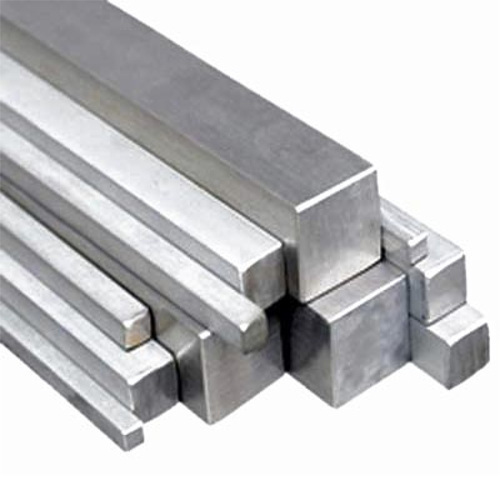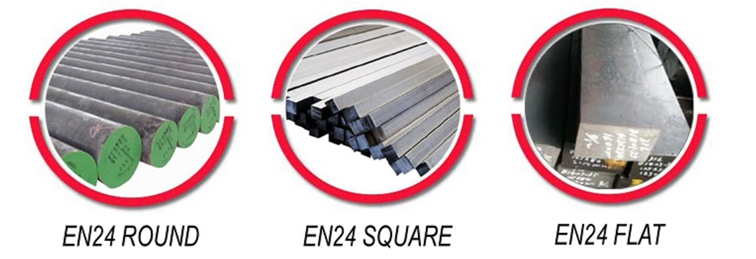EN-24
Grade Introduction
EN24 Alloy Steel is a very high-strength steel alloy that is supplied hardened and tempered. The grade is a nickel-chromium molybdenum combination – this offers high tensile steel strength, with good ductility and wear resistance characteristics. With relatively good impact properties at low temperatures, EN24 is also suitable for a variety of elevated temperature applications. EN24 sections larger than 250mm may still be available in the quenched and tempered condition, but it should be noted that a fall-off in mechanical properties may be apparent approaching the center of the bar. It is therefore recommended that larger sizes are supplied in the annealed (softened) condition and that quenching and tempering are carried out after initial stock removal. This should achieve better mechanical properties towards the core.
Grade Application:
- High strength shafts
- Punches & dies
- Drill bushings
- Retaining rings
- Gears
Our Supply Range
Chemical Composition
The following table shows the chemical composition of EN24 steel:
| Element | C | Si | Mn | P | S | Cr | Mo | Ni |
| Content (%) | 0.36-0.44 | 0.10-0.35 | 0.45-0.70 | 0.035 Max | 0.040 Max | 1.00-1.40 | 0.20-0.35 | 1.30-1.70 |
Mechanical Properties
| Condition | Tensile
N/mm² |
Yield
N/mm² |
Elongation
% |
Izod
KCV J |
Hardness
Brinell |
| T | 850-1000 | 650 | 13 | 35 | 248-302 |
| U | 925-1000 | 755 | 12 | 42 | 269-331 |
| V | 1000-1150 | 850 | 12 | 42 | 293-352 |
| W | 1075-1225 | 940 | 11 | 35 | 311-375 |
| X | 1150-1300 | 1020 | 10 | 28 | 341-401 |
| Y | 1225-1375 | 1095 | 10 | 21 | 363-429 |
| Z | 1550 | 1235 | 5 | 9 | 444 |
Hardness:
248 – 302
Heat treatment:
Heat treatment temperatures, including rate of heating, cooling and soaking times will vary due to factors such as the shape and size of each steel component. Other considerations during the heat treatment process include the type of furnace, quenching medium and work piece transfer facilities. Please consult your heat treatment provider for full guidance on heat treatment of alloy steel.
Hardening:
EN24 is supplied ready heat treated. If further heat treatment is required annealed EN24 should be heated slowly to 830-850°C and after adequate soaking at this temperature quench in oil. Temper as soon as tools reach room temperature. Hardening from a neutral salt bath, will reduce the possibility of scaling or decarburization. Heat to 830-850°C and after equalization quench in oil.
Tempering:
Heat carefully to a suitable temperature selected by reference to the tempering chart or table, soak at the temperature for 2 hours per 25mm of ruling section, then all to cool in the air. Tempering between 250-375°C is not advised as tempering within this range will seriously reduce the impact value. The tempering temperature is dependent on the required mechanical properties, the steel can achieve EN24U, EN24V, EN24W, EN24Y & EN24Z.
Physical Properties:
| Thermal conductivity at °C | W/(m*k) |
| 40.5 | 20 |
| 32.5 | 350 |
| 25.5 | 700 |
Thermal Properties
Thermal conductivity – 41.9 W/m-°C
Forging Properties:
Preheat carefully, then raise temperature to 1000-1100°C for forging. Do not forge the steel below 850-1100°C. After forging cool slowly preferably in a furnace.
Stress Relieving:
When parts are heavily machined, ground or otherwise subject to cold work, stress relieving will be beneficial prior to hardening. Heat carefully to 650-670°C, soak well before cooling in the furnace or in the air.
Normalizing
- Nominal normalizing temperature:840-900°C.
- Hold the temperature for several hours.
- Cooling in the air.
Annealing:
Heat slowly to 840-860°C, soak well and allow to cool with the furnace to 580°C, before withdrawing.
Density
Density – 7840 kg/m3
Machinability:
EN24 is a very popular grade of through-hardening alloy steel, which is readily machinable in the “T” condition.


